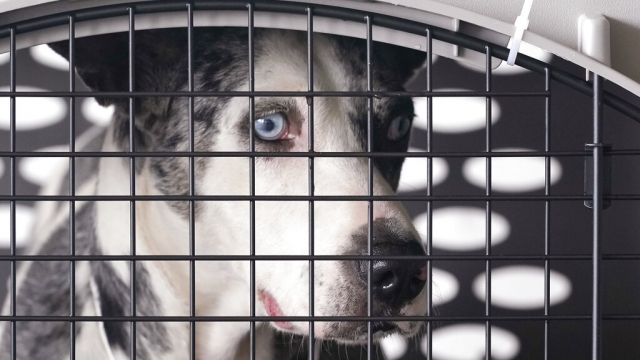Tarek Ziad says his cat Charlene is the joy of his life.
"When I first got her, her name was cow because she looks like a cow," Ziad said.
But his happiness turned into a nightmare when he came home after a long weekend to the 3-year-old cat injured while she was in the care of Ziad's housemates. He rushed her to a veterinary emergency hospital.
"I didn't have pet insurance, so when I went, they took her and did all the basic stuff, got her stable, and that was a couple hundred dollars, which was really hard for me because I worked part-time at the time," Ziad said. "I didn't have much money."
Charlene needed immediate surgery, but with no money left to pay for the expensive medical procedure, Ziad made the hard decision to surrender his cat to ananimal shelter.
"They could take her in, and they would treat her, but she wouldn't be my cat anymore," Ziad said. "I was crying for like a day and a half."
"Now we're seeing more, medically and behaviorally, more and more animals in that need of more specialized care," said Valeria Caceres-Gil, senior manager of admissions and matchmaking at the ASPCA adoption center.
Caceres-Gil says the increased number of animals in shelters today is being driven by a combination of many factors, but nationally, it is not being driven by an increase in owner surrenders to shelters.
"Some of the factors that have influence in pet ownership is the struggle that many community members are finding in when they are looking for pet friendly housing and also affording veterinary care," Caceres-Gil said.
Two shelters told Scripps News a lack of vets is also affecting shelters nationwide.
SEE MORE: Animal rescues see fewer adoptions, more surrenders due to inflation
While the national animal shelter intake numbers are still below pre-pandemic levels, many animal welfare organizations, like the Animal Care Centers of New York City, are struggling with capacity challenges, with more animals coming into the shelters than leaving. They say one of the causes of the rising numbers in shelters is that they are staying longer at the sites.
"As they stay inside the shelter longer, it's not great for them mentally or physically, and many of them will break down," said Katy Hansen, director of marketing and communications at Animal Care Centers of NYC. "They're stressed, so they're not showing well to potential adopters that come in. We went from an average length of stay of eight days pre-pandemic to now we're at 13 days."
The Shelter Animals Count database released a report in January 2023 that shows nationwide shelter animal intake was 4% higher in 2022 than in 2021, though still lower than it was in 2019. This report also revealed that the number of animals leaving shelters remained flat in 2022 versus 2021, meaning space for animals in shelters is shrinking.
"I think this is a great time to reach out to your local shelter and see how you can help," Caceres-Gil said. "Even if you cannot adopt an animal right now, there are many resources, there are many other ways that you can help, volunteering in becoming a foster parent."
According to the February Consumer Price Index, year-over-year pet food is up 15%, and pets and pet products are up 12%. The ASPCA estimates that the average annual cost of a dog is $1,391, while the average annual cost of a cat is $1,149.
"The other thing about the pets that are coming in now is pets are being surrendered by families that have owned these pets for years," Hansen said. "They're pets that are from families that are struggling; they're struggling financially to provide for their family."
As for Ziad, he was able to keep Charlene.
"I actually didn't even know that the ASPCA could treat her for free or reduced until I got there and was trying to give her up," Ziad said.
His cat received the care she needed at the ASPCA.
"We offer fully subsidized or partially subsidized veterinary care for parents that are struggling," Caceres-Gil said.
Now Ziad says he's grateful, and he won't be letting go of his dear friend Charlene.
Trending stories at Scrippsnews.com



